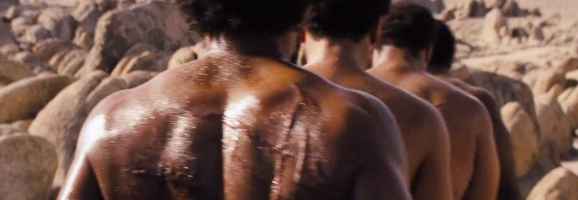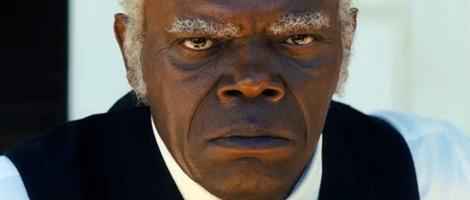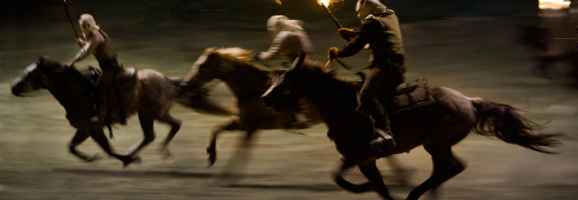Unchained: Why Django is Tarantino’s Most Important Film
There are many words that can be used to describe Quentin Tarantino’s latest entry into the film world; Brilliant, wonderful, interesting, spectacular, controversial, action-packed, violent (and I guess bad if you didn’t like the movie for some reason). Any of these words could quite easily be applied to Django Unchained. There is one word, however, this writer feels has been too often used in reviews and discussions of this film, and inappropriately so. The word… fun.
While Django is, without much doubt, a highly entertaining experience in which an audience is brought much laughter and joy in many scenes, the film is actually the first film in which Tarantino treats very serious subject matter with a sort of delicacy and respect deserved (in Inglourious Basterds, without the presence of the opening scene, the depiction of the horrible things that were done by the Nazis would have been virtually nonexistent).

The treatment of slavery in Django Unchained is the reason for this being the director’s most important film. Note that I am not arguing that this is Tarantino’s best film, but rather his most poignant film, and in a way it is a breakthrough for the filmmaker in which he has not only achieved the initial goal of bringing captivating entertainment to an audience, but also has put together a film with much more meaningful content that does not take itself too lightly.
In contrast to most, if not all, Tarantino films, in which the director uses his stories in order to blend genres and use his unique style of filmmaking in different ways, Django is a film that utilizes the director’s filmmaking ability and genre-mixing to tell the story as effectively and with as much meaning as possible. There are multiple scenes in the film that display the evils of slavery, including a brutally violent fight, a scene involving attack dogs, and a scene involving a “hot box”. Without giving anything away, all of the aforementioned scenes depict slavery in a very real, very gritty, manner.
It’s not only the scenes involving slavery that are made with care, but also the characters in the film that come to represent many of the themes brought forward throughout the film. The character that particularly comes to mind is Stephen, played by Samuel L. Jackson (in what is his best performance in a very, very long time). Stephen is a servant on the plantation owned by Leonardo DiCaprio’s Calvin Candie (another absolutely astounding performance) who has become a participant in the poor treatment of his fellow slaves (a characteristic the film shows in an unfavorable manner to say the least).

Stephen may quite honestly be the most important character in Django Unchained in that his acceptance of slavery and his cooperation and apparent enjoyment of being the “favorite slave” of Candy Land collaborates in strict contrast with the attitudes and morality of the Django character (Jamie Foxx; another stellar performance) and provides a villain, or even an extension of DiCaprio’s villain, who is not simply the evil slave owner. He is a symbol of what can come from accepting and embracing something as disillusioned and dreadful as slavery.
Since a majority of Tarantino’s filmography is generally thought of as somewhat empty films that have creative dialogue, unique music choices, and are extremely entertaining romps, the depth added in Django strays from the Tarantino norm. While it remains to be seen what this means for the future efforts of the director, the potential is absolutely colossal. If Tarantino is able to continue to make films like Pulp Fiction, Inglourious Basterds, Reservoir Dogs, Kill Bill, and Jackie Brown while adding importance and meaning to the subject matter, the future is brighter than one could imagine.
So, while Django Unchained may not be Quentin Tarantino’s masterpiece, it’s his first film that displays something that is not a complete fantasy and not too cartoonish. Yes, there is plenty of signature Tarantino violence in the film, and yes there is plenty of humor (The Ku Klux Klan scene is one I laughed at more than maybe any single scene of a film this year). Yes, there is much enjoyment that can be had from experiencing Django Unchained and the high quality performances (last one that absolutely needs to be mentioned is Christoph Waltz’ Dr. King Schultz). Yes, there will continue to be people who call this film fun and a simple wild thrill ride.

But, there is so much more to this film than fun and games and Tarantino playing with film genre. This is truly a film that can be discussed as a legitimate observation of slavery, albeit not necessarily anything awe-inspiringly eye-opening or poignant, but a film which brings Tarantino closer to becoming thought of as more than a strange guy who creates great unique films. It suggests there is something more in Tarantino (let’s just hope he’s not serious about his thought to quit making movies), and that his love of film has the potential to tell important stories with important messages in his wonderfully offbeat style.
So yes, there are many ways to describe Quentin Tarantino’s Django Unchained; Exuberant, wonderful, dark, unique, colorful, vibrant, tragic, uplifting (and I guess insulting if you didn’t like the movie for some reason). But fun? Simply calling this movie “fun” is insulting and wildly inappropriate for what has been accomplished with this film. It’s a film that deserves a much more important and thoughtful adjective than “fun”.
What do you think? Leave a comment.











…and as important that this movie, this review shares the same value. There has been various reviews about this movie, some completely misunderstanding the message and topic of it. Thanks for writing this.
I do agree that in Django Unchained, Tarantino pays more attention to his characters, probably more so than in any of his other films. He only uses the hardships of slavery to establish the traits of certain characters, such as toughness for Django or acceptence in the case of Stephen, as you pointed out. This film is definitely more.
I like this Kevin. I am yet to watch this and very happy to read that it is one of his more serious and less animated movie. Don’t get me wrong, I love his work but Inglourious Basterds really showed that he is a master of his craft.
I have not had the chance to see many of Tarantino’s films, but this article makes me want to watch more of them. Great read, thank you.
The most important thing about this film is this: for Tarantino to have made it so recently, coupled with the very, very controversial nature of the film, was to throw a rock into a body of water, except that in this case the “water”, so to speak, is race relations in this day and age. How much hate is still left? How much guilt is still left? A lot more than anyone thought.
Delightful could be a description that you’re looking for.